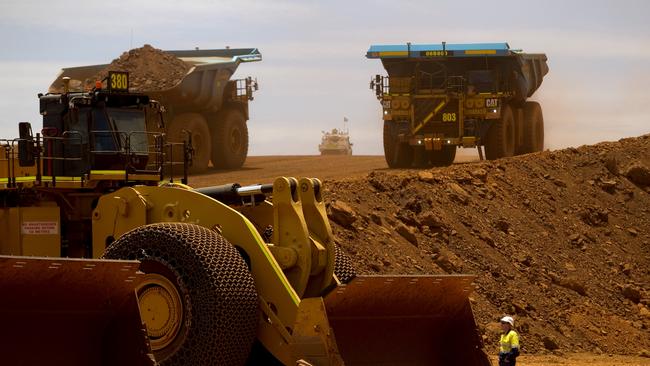Rio Tinto iron ore shipments hit by delays after derailment
Rio Tinto has suffered a setback just months after opening its newest West Australian iron ore mine, with a 20-wagon train derailment knocking out supplies for more than a week.

Rio Tinto has suffered a setback just months after opening its newest West Australian iron ore mine, with a 20-wagon train derailment knocking out supplies for more than a week.
The mining giant said an incident occurred at its Gudai-Darri rail line on September 3 with 20 wagons derailing at the rear of the autonomous train.
While no one was injured and the line is running again, the accident has been referred to the National Rail Safety Regulator.
“Recovery of the site is complete, and the line is now operational. The safety of our people and communities is our highest priority and an investigation into how the derailment occurred is ongoing,” a spokesman said.
The 166km rail line is the only route to market from the Gudai-Darri mine, with any hit to production to be revealed at its next quarterly report due on October 17. Rio currently has full-year iron ore export guidance of 320 million to 335 million tonnes.
Rival BHP suffered a major multimillion-dollar train disaster in 2018 when it was forced to deliberately derail a loaded runaway iron ore train, about 120km from Port Hedland. Rio also suffered an accident at its Weipa operations the following year.
The Gudai-Darri mine only sent its first shipment to port in mid-June with the $US3.1bn ($4.5bn) project incurring a 20 per cent cost blowout and a six-month delay. Gudai-Darri is the first new mine completed by Rio in a decade, and will supply high-grade iron ore to its customers.
Its entry into the market will reduce the quantity of lower-grade product Rio has been selling, and help lift volumes from its Pilbara iron ore network.
The Gudai-Darri project is expected to produce about 43 million tonnes of iron ore each year when the first phase of the mine is fully ramped up. It could eventually produce 70 million tonnes if an expansion goes ahead.
Rio’s Pilbara output peaked at 338.1 million tonnes in 2018, and its Pilbara operations shipped only 321.6 million tonnes in 2021. While Rio maintained its full-year production guidance in iron ore, the impact of the rapid spread of Covid-19 through the company’s Pilbara workforce in the first three months of the year mean first-half exports of 151.4 million tonnes still remain behind their levels in the first half of 2021.
Rio booked underlying earnings before interest, tax, depreciation and amortisation of $US15.6bn for the first half of the year, as falling commodity prices bit into the company’s revenue.
Recent falls in the iron ore price have been driven by concerns that major players in China’s debt-ridden real estate market could face a reckoning, amid fears a crisis of confidence from buyers could send the sector into a downturn lasting years.
Iron ore futures were trading at $US102 a tonne on Monday, with China’s peak construction season fuelling demand for the steelmaking material despite lingering economic concerns. The Commonwealth Bank noted iron ore gained $US6.89 a tonne or 7.2 per cent last week as the onset of the peak construction season in China bolstered sentiment.
Iron ore retained is crown as Australia’s biggest commodity export in the 2021-22 financial year, worth $133bn, but that is down more than 10 per cent from the previous year.
Australian producers exported about 894 million tonnes last financial year, up from 872 million tonnes. That is expected to rise to 915 million tonnes this year, with a further lift to 948 million tonnes in the 12 months to the end of June 2024.





To join the conversation, please log in. Don't have an account? Register
Join the conversation, you are commenting as Logout